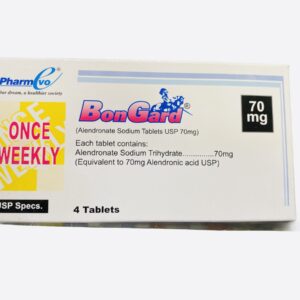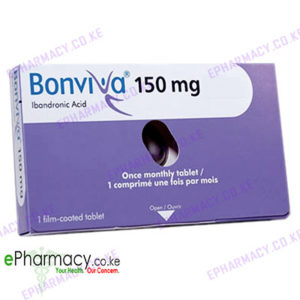Description
Uses and Administration of Ibandronate in Kenya
Ibandronate is available in Kenya as Cadronate 150mg and is an aminobisphosphonate that is a potent inhibitor of bone resorption. It is used as the sodium salt in hypercalcaemia of malignancy, and for the prevention of fracture and bone complications in patients with breast cancer and bone metastases. Ibandronate is also under investigation for the treatment and prevention of osteoporosis.
Sodium ibandronate is administered by intravenous infusion, the dose being expressed in terms of ibandronic acid. Sodium ibandronate 1.13 mg is approximately equivalent to 1 mg of ibandronic acid. For hypercalcaemia of malignancy, a single dose of the equivalent of 2 to 4 mg ibandronic acid is given, up to a maximum of 6 mg; it is diluted in 500 mL of sodium chloride 0.9% or glucose 5%, and infused over 2 hours.
For the prevention of skeletal events in Kenya patients with breast cancer and bone metastases, a single dose of the equivalent of 6 mg ibandronic acid is given, diluted as above, but infused over 1 hour. The dose is repeated every 3 to 4 weeks. Alternatively, ibandronic acid 50 mg daily may be given by mouth; specific instructions for its administration should be followed to minimise adverse effects and permit adequate absorption.
How to take Cadronate tablets in Kenya
- Patients should be instructed to swallow Ibandronic acid tablets (Cadronate) whole (DO NOT CRUSH) with plenty of water (not less than 200 mL), in an upright position (standing or sitting). Mineral water with a high concentration of calcium should be avoided.
- Tablets should be taken on rising for the day, on an empty stomach, at least 30 minutes before breakfast and any other oral medication
- Patients should remain upright after taking the tablets, and should not lie down before eating the first meal of the day
- Cadronate should not be taken at bedtime, or before getting up for the day
- This instructions should be followed to reduce the side effects and increase the absorption of the drug
Adverse Effects and Precautions of Cadronate/Ibandronic acid
Gastrointestinal symptoms such as abdominal pain, dyspepsia, and nausea are the most frequent adverse effects. Severe oesophageal reactions such as oesophagitis, and ulceration have occurred; patients should be advised to stop taking the tablets and seek medical attention if they develop symptoms such as new or worsening dysphagia, pain on swallowing, retrosternal pain, or heartburn. Gastric and duodenal ulceration have been reported. To minimise the risk of oesophageal reactions, precautions similar to those for alendronate should be observed. Hypocalcaemia should be corrected before starting ibandronate therapy. Transient fever after parenteral administration is common, and flu-like symptoms have been reported.
Pharmacokinetics of Cadronate 150mg in Kenya
Like other bisphosphonates, ibandronate is poorly absorbed after oral administration; absolute bioavailability is less than 1%. Absorption is decreased by food, especially by products containing calcium or other polyvalent cations. Bioavailability is reduced by about 90% when given with food, by about 30% when given half an hour before food, and by about 75% when given 2 hours after food. About half of the absorbed portion is sequestered to bone; the remainder is excreted in urine. Plasma protein binding is about 87%. Bisphosphonates do not appear to be metabolised, and the unabsorbed fraction of ibandronate is excreted unchanged in the faeces.




Reviews
There are no reviews yet.